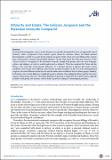Ethnicity and estate : the Galician Jacquerie and the Rwandan Genocide compared
Abstract
In national historiography, estate (social) divisions are typically disregarded in favor of supposedly shared ethnicity, which is proposed to have united a given nation for centuries. Hence, the Polish national historiography is unable to account for the Galician Jacquerie (1846), when serfs were killing nobles, despite their (retroactively) assumed shared Polish ethnicity. On the other hand, the 1994 mass massacre of the Tutsis by Hutus is recognized as the Rwandan Genocide, though both groups share the same language, culture, and religion—or what is usually understood as ethnicity. What has sundered the Tutsis and the Hutus is the estate-like socioeconomic difference, or a memory thereof. It appears that under certain conditions estate (social, class) difference may become an ethnic boundary. In the case of the aforementioned jacquerie, the estate difference made the serfs and the nobles into two different de facto ethnic groups. Similarly, in Rwanda, estate (social) difference is implicitly posed as ethnicity, thus making the Hutus and the Tutsis into separate ethnic groups. However, the official definition of genocide as adopted by the United Nations explicitly excludes social groups (for instance, estates) from its purview, leading to terminological paradoxes.
Citation
Kamusella , T 2021 , ' Ethnicity and estate : the Galician Jacquerie and the Rwandan Genocide compared ' , Nationalities Papers , vol. FirstView . https://doi.org/10.1017/nps.2021.12
Publication
Nationalities Papers
Status
Peer reviewed
ISSN
0090-5992Type
Journal article
Collections
Items in the St Andrews Research Repository are protected by copyright, with all rights reserved, unless otherwise indicated.

